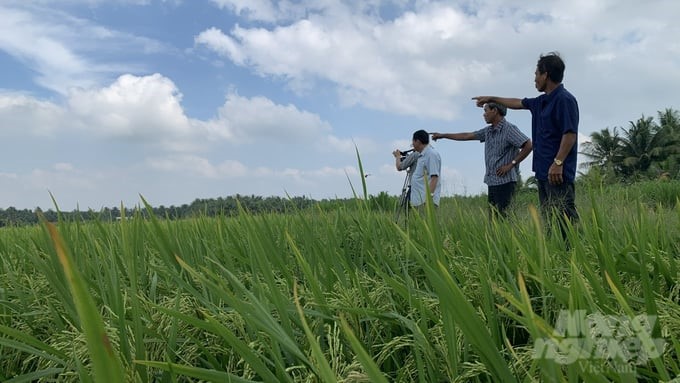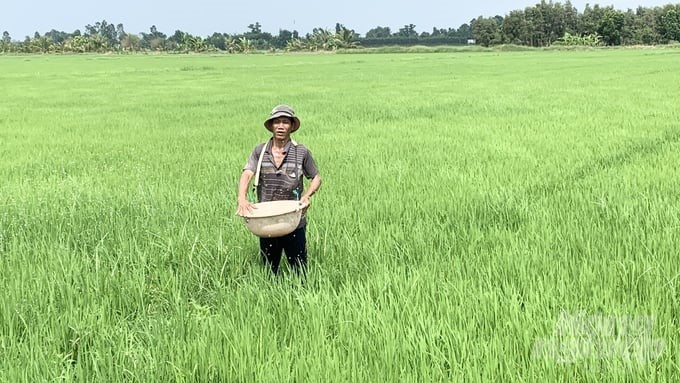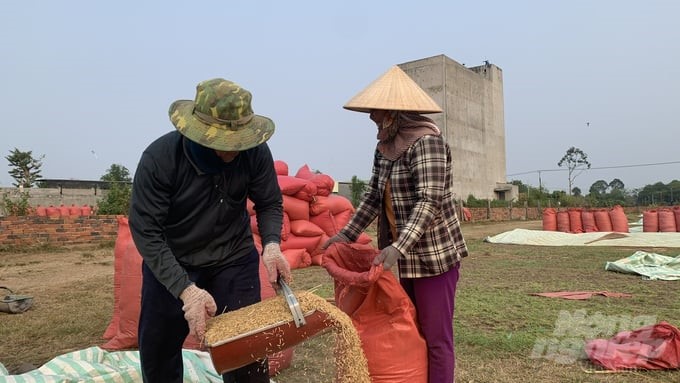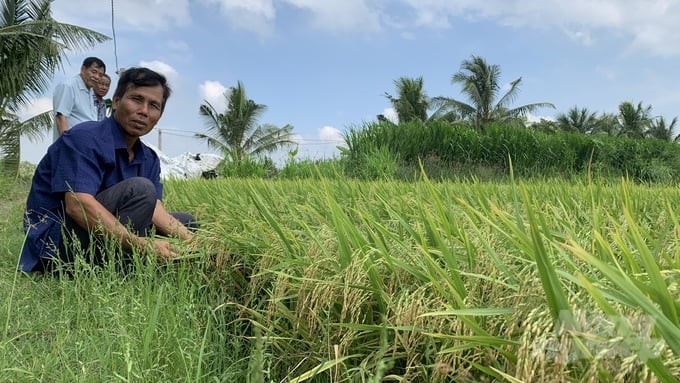May 29, 2025 | 16:08 GMT +7
May 29, 2025 | 16:08 GMT +7
Hotline: 0913.378.918
May 29, 2025 | 16:08 GMT +7
Hotline: 0913.378.918

Many farmers in Tra Vinh province applied eco-friendly rice farming techniques in the autumn-winter crop, which helped to significantly reduce the amount of rice seeds, fertilizers, and pesticides compared to previous years but still achieve high productivity. Photo: Ho Thao.
These days, the atmosphere in the rice fields that are in the ripening stage in Chau Thanh district, Tra Vinh province, becomes boisterous with conversations between traders and farmers. According to many field owners in Luong Hoa A commune, this year's rice is promised to be more profitable than every year, not only due to the price increase but also thanks to the application of eco-friendly rice farming techniques sponsored by the Organization of Supporting Regional Solutions for Community and Ecosystem (Building Resilience Against Climate Effects - BRACE Fund).
According to Farmer Tran Phan Rang, in Hoa Lac C hamlet, Luong Hoa A commune, Chau Thanh district, in addition to being trained on how to process straw to make food for cows and compost organic fertilizer, he was also guided to reduce the amount of seed sown from 200 kg/ha to 120 kg/ha and save water through the alternating wet and dry method.
The farmer said, "Reducing rice seeds, fertilizers, and pesticides and using irrigation water appropriately have helped me save about VND 3 million/year. Through that, I also highly appreciate the method of alternating wet and dry irrigation because farmers often face water shortages due to saltwater intrusion and drought."
Mr. Rang described that instead of pumping water based on his feelings like before, he now only maintains water according to each stage. Firstly, in the first week after sowing, water is maintained continuously for 25 days because during this period, water plays an important role in the development of rice plants.
Secondly, in the period of 40 days after sowing, Mr. Rang maintains the water surface at the same level as the ground or drops it 15cm below the ground. Thirdly, when fertilizing for the third time, he pumps water into the field to avoid the fertilizer being exposed to light and at risk of decomposition.
Fourthly, in the 70-day period after the rice plants grow, Tra Vinh farmers maintain high water levels for about 10 days to create favorable conditions for the pollination process without the problem of imperfect grains. Finally, in the milk period, water only needs to be kept at or 15cm below the field surface.

Thanks to the application of eco-friendly rice farming techniques, farmers reduce the amount of fertilizer from 150 kg/ha to 120 kg/ha each time they fertilize. Photo: Ho Thao.
According to the Management Board of the Eco-Friendly Rice Farming Project (Tra Vinh Provincial Farmers' Association), initially the model was only deployed to 20 households in Phong Thanh commune, Cau Ke district, and Luong Hoa A commune, Chau Thanh district, with a total area of 4 hectares.
Convincing households that are familiar with old farming methods faced many difficulties. However, seeing the effectiveness, the number of participating households gradually increased. The project has attracted up to 600 members to participate, increasing the raw material area to 500 hectares. Of which, 50 hectares are the rice-shrimp raw material area, and the remainder of 450 hectares are the raw material area for producing varieties (OM576, OM4900, OM5451, OM18, and Dai Thom 8) in Chau Thanh and Tra Cu districts.

In the last autumn-winter crop, the rice yield of farmers in Chau Thanh district, Tra Vinh province, reached 7 tons/ha, with a higher selling price than that of previous years. After deducting all expenses, rice growers still earned a profit of over VND 30 million/ha. Photo: Ho Thao.
Mr. Chau Vinh Phuc, Project Officer, Tra Vinh Provincial Farmers' Association, said: Previously, with traditional rice growing methods, farmers earned an average profit of about VND 60 million/ha/year (3 crops). When transforming to the new method, the average profit increased by about VND 30 million/year. In the coming time, the Provincial Farmers' Association proposes to continue implementing the project, disseminating and mobilizing the community to actively participate in the eco-friendly rice farming program. The goal is to contribute to environmental protection and community health, aiming for sustainable agriculture and bringing clean products that meet export standards and have high economic efficiency.
According to Mr. Phuc, realizing the model’s advantages, the Cau Ke District People's Committee coordinated with Loc Troi Group to deploy an eco-friendly rice farming model throughout the district. The Group has supported deferred payment of fertilizers, pesticides, and seeds and ensured product consumption for farmers in Phong Thanh commune.
In particular, through the media and the website of the Provincial Farmers' Association, the Board of Directors of Chau Hung Agricultural Trade and Production Service Cooperative (Hung My commune, Chau Thanh district) has actively contacted the Project Management Board to register for training on eco-friendly rice farming techniques for members. Techniques include straw treatment, seed saving, effective fertilizer use, and water regulation measures. Currently, the cooperative is planning to deploy an additional 130 hectares of eco-friendly rice, with the goal of changing production thinking towards environmental friendliness and reducing greenhouse gas emissions.

Tra Vinh province sets a goal of reducing methane (CH4) emissions from rice fields through advanced farming methods. Recently, the province registered to cultivate 2,000 hectares of rice that achieve carbon credits by 2024. Photo: Ho Thao.
According to the Tra Vinh Department of Agriculture and Rural Development, in 2022, the total farming area across the province reached about 201,000 hectares, with an average greenhouse gas emission of 8,100 kg CO2e/ha/year. The total amount of emissions due to rice farming was about 1.6 million tons of CH4/year. Tra Vinh province sets a goal of reducing methane (CH4) emissions from rice fields through measures such as irrigation water management, fertilizer management, selecting new rice varieties, and especially implementing the rice farming technique of alternating wet and dry irrigation.
Recently, the province also registered rice farming areas to achieve low carbon certification for 2024, with an expected deployment area of over 2,000 hectares, making an important contribution to reducing greenhouse gas emissions.
Mr. Le Van Dong, Deputy Director of the Tra Vinh Department of Agriculture and Rural Development of Tra Vinh Province, said that the province is focusing on improving eco-friendly rice farming techniques, aiming to build low-emission agriculture. Tra Vinh is actively carrying out dissemination and mobilization activities for farmers, consumers, and related partners to promote smart rice farming, thereby not only bringing benefits to the environment but also increasing income and profits for farmers.
Translated by Huyen Vu Thu
/2025/05/25/4127-3-073637_820.jpg)
(VAN) Thanks to the promotion from an FAO-implemented project, vegetable production in greenhouses in Moc Chau has seen strong development, from 1.5 hectares in 2021 to nearly 50 hectares in 2024.

(VAN) FAO has recently supported USD 140,000 to implement the project 'Risk mitigation human-animal interface risks through disease control initiatives in pig farming.'

(VAN) The People's Committee of Tra Vinh province has approved an adjustment to the investment policy for the Green Hydrogen Plant project, increasing its area to approximately 52.76 hectares.
![Reducing emissions from rice fields: [2] Farmers’ commitment to the soil](https://t.ex-cdn.com/nongnghiepmoitruong.vn/608w/files/news/2025/05/05/dsc08881jpg-nongnghiep-140632.jpg)
(VAN) Clean rice cultivation model in Thuong Tan commune, Bac Tan Uyen district, is assisting local residents in achieving sustainable agriculture by substantially reducing costs, increasing productivity, and protecting the environment.

(VAN) At the conference to disseminate Resolution No. 68, AgriS introduced its digital agricultural ecosystem and reaffirmed its commitment to accompanying the Government in promoting private sector development and sustainable agriculture.

(VAN) 'Blue Ocean - Blue Foods' initiative is designed to restore marine ecosystems and establish sustainable livelihoods for local communities by cultivating a minimum of 1,000 hectares of cottonii seaweed in the first three years.
/2025/05/21/4642-3-112707_603.jpg)
(VAN) The V-SCOPE project has made direct contributions to three out of six pillars of the Comprehensive Strategic Partnership between Vietnam and Australia.